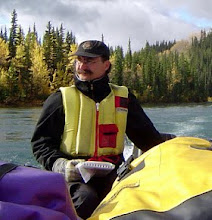

Last Friday my step-mother, Nettie, passed away. I flew to Winnipeg to be with Dad and step-siblings. Nettie and Dad, both widowed, married in their retirement, well after my brothers and I had left home and started families far from Winnipeg. And while we rejoiced in my Dad's happiness with his second wife, we had limited connections to our three step-sisters and step-brother. This changed over the next fifteen years as Nettie contracted Alzheimer's disease and the network of family drew tighter to support Dad in his diligent (a favourite word of mine, Latin for “twice loved”) and complete attention to Nettie. Gradually I've come to realize not only how much my step-siblings in Winnipeg have cared for my Dad, but also that he is grandfather to their children. He has extended the family that loves and cares for him like we do. But these things only become obvious when the web of relations are weighted by need.
Amidst the bright sunshine of a windy prairie spring and chorused by honking Canada geese, we had a brief ceremony on Thursday afternoon. Dad, and my step-brother, Nettie's eldest, gently lowered Nettie's remains alongside her first husband. Final words - a silence - and photos of the gathered family brought closure to the funeral and interment. Dad was quiet as we headed back to the car.
We agreed it was a good time to visit Mum's grave across town. Brookside is a large venerable cemetery in Winnipeg. When established it was a long way out on the prairie. Now. although bracketed by airport, Red River Community College and an anonymous landscape of warehouses and asphalt, it retains its charm. The open vista over the runways looking west and the size and forested nature of Brookside preserves a tranquil atmosphere. The afternoon light of the spring sun on last year's grass adds a golden aura broken up by trunks of prairie oak, elm and cedar, reflected by the polished black and red grave markers.


Dad drives by memory (almost) to Mum's grave site. We walk between the rows of stone reading off the names. It takes awhile before we see the large NEUFELD scribed beneath a sunset on a prairie farm landscape. I don't remember the stone so large. In the lower right is “Helen” with a some musical notes accenting her continuing presence. Dad stops, thinks a moment, and then says, “I'd like a hockey stick or a baseball bat.” I promise to pound in a hockey stick next to the gravestone so we can find it easier next time. He seemed satisfied things would be done correctly.

Then we headed off to find Oma and Opa's graves. Dad remembered them between two cedar shrubs but after sometime we gave up and visited Grozsma's grave beside Uncle John with his two wives. His first wife, Helen, was Grozsma's cousin. Grozsma lived with us for many years. The death of her husband and the subsequent challenges of raising four children through the darkest years of the Great Depression broke her spirit. Consequently Mum was raised by Aunt Helen, her namesake. Just after I was born Grozsma moved in and I had the privilege of growing up in a tri-generational household, learning my mother tongue of German and hearing incredible stories about life in Czarist Russia and the horrors of the Bolshevik Revolution visited upon the Mennonites in the Ukraine.


The cemetery office provided a map to Oma and Opa. We'd been close, no longer between two shrubs, the stone was enclosed by the branches into a private niche. Aunt Betty's remains were added to the grave last year and, as with the other grave side visits, the memories of Christmas dinners, my aunt's love for painting, the clean soprano of my mother's singing, the times as a small boy I was brought to tend the grave of her brother Henry, my namesake, and a host of other experiences growing out of the relationships invested in the landscape of Winnipeg came flooding back. Perhaps a little bittersweet, but how poor would be our lives without these memories of challenges overcome, lives lived and the bonds of live tieing us together across geography and through time.


e.jpg)
.JPG)


Thanks Dad.
ReplyDeleteLove,
Erin